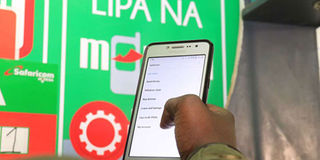Kenya should change to cashless economy

Mobile banking service M-Pesa. Many benefits will accrue from a cashless economy. PHOTO | FILE | NATION MEDIA GROUP
What you need to know:
- Safaricom’s M-Pesa is a revolutionary idea credited with connecting the hitherto unbanked population to the formal financial sector.
- The war on money laundering, terrorism financing and funding of illegal activities will be won easily with the elimination of high-denomination notes.
In the modern economy, money performs important functions such as being a medium of exchange, measure and store of value and standard of deferred payments. It also bestows prestige and status.
Printed money has its roots in China, during the reign of Emperor Chen Tsung (998-1022).
A Bureau of Exchange was established within the government to issue and circulate paper notes with the first government-issued banknote coming out in 1023.
International commerce has since grown. Governments have central banks that formulate and influence monetary policy.
Rapid technological innovations have had a big impact on commercial transactions.
The convenience and ease of technology is fuelling the emergence of cashless societies.
DIGITISATION
Financial transactions are not executed with hard currency in form of banknotes or coins, but transfer of digital information — an electronic representation of money — between the two parties in the transaction.
Of all the advanced economies to go completely cashless, Sweden could be the first. Just two per cent of the value of transactions in the Scandinavian country consist of cash with an overwhelming majority of Swedes embracing digital methods of payments.
According to that country’s central bank, the Riksbank, more Swedes have access to debit and credit cards than to cash.
This is buttressed by a sophisticated technological infrastructure powered by cutting-edge innovations.
The popular instant payment app Swish, set up in 2012 by seven of the largest commercial banks, quickly gained traction as over half of consumers signed up.
Sweden is also home to tech giants like Spotify and Microsoft-owned Skype.
MOBILE BANKING
Replicating Sweden’s system in Kenya could be a tall order, but we have the fundamental infrastructure to support a cashless economy.
Most local banks have integrated mobile banking services into their systems, deepening financial inclusion.
Safaricom’s M-Pesa is a revolutionary idea credited with connecting the hitherto unbanked population to the formal financial sector.
Many benefits will accrue from a cashless economy. First, the costly printing of currency will stop.
With the government set to spend upwards of Sh15 billion in printing the new banknotes, it would divert the huge amount to other sectors of the economy.
Secondly, the war on money laundering, terrorism financing and funding of illegal activities will be won easily with the elimination of high-denomination notes. The black market will suffer an irreparable damage with the counterfeiting ceasing to exist.
TAX
Thirdly, the Kenya Revenue Authority would widen its tax base as all transaction pass through the formal financial systems.
It will be hard for anyone to evade tax. Further, KRA can accurately determine the tax due from a taxpayer.
Fourth, risks like theft by employees, burglary and robbery involving cash will be eliminated, just as the cost of physical security, transporting and counting of cash.
Lastly, it will ease data collection on citizen’s spending paradigms. The government can better track movement of money to keep close tabs on any black money and illegal transactions in the country.
Mr Maosa is a banker; [email protected]





